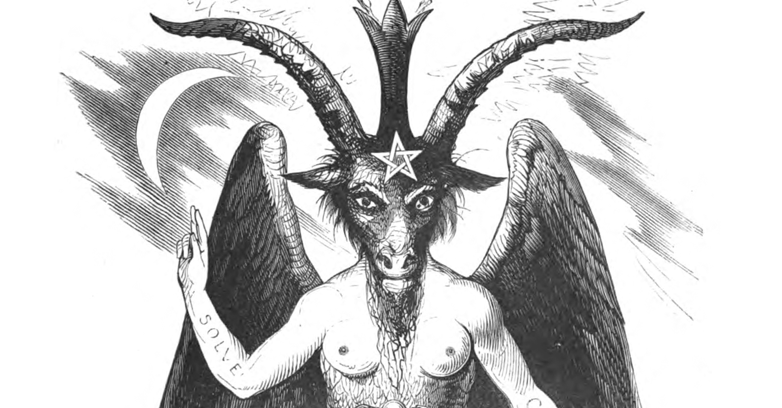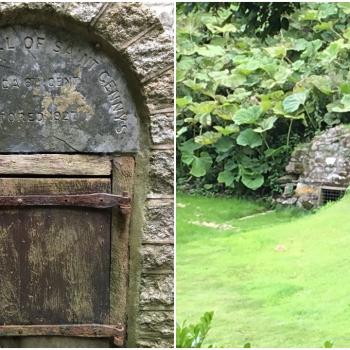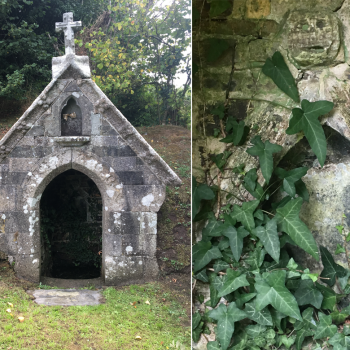Last Tuesday, during the most sacred time of holy week, a Catholic church was subject to an apparent hate crime.
A 17 year old entered St Mary’s Church in Great Yarmouth and proceeded to commit acts of arson, including the attempted burning of a sacred icon. He also left a picture of Baphomet (above), a figure frequently identified with Satan, on the altar.
This is the second time that this church has been recently targeted. Four months ago, a Satanic image was left at the foot of a cross at the back of the church.
Understandably, the clergy and parishioners have been left disturbed and appalled. Parish priest Fr Anthony Nwankwo said, “Our church and sanctuary has been desecrated. We will not close the church but to use the altar and sanctuary we need to go through a service to re-consecrate the area.”
As yet, we do not know why the man vandalised the church. But the police treated the latest incident as a religiously aggravated hate crime.
The Pagan Reaction
When this story broke, it was shared by social media among some Pagan communities. Although the majority of Pagans were rightly horrified and condemned this act of vandalism, the reaction of some individuals was disturbing.
“Good!” commented one person on Facebook.
“Keep up the good work,” read another comment.
Still more comments hinted that this action was justified, in light of the Catholic church’s history of child abuse.
Although the number of people in the online Pagan community who either praised this crime or suggested that it might be somehow justified were comparatively low, it was enough to be worrying. Because this is the sort of mindset that leads to radicalisation.
I get it. Many Pagans are angry at Christianity, and with the Catholic church in particular. Considering the crimes the Catholic church has committed and continues to commit, including persecution, forced conversions, rampant misogyny and child abuse, that anger is justified. But criminal acts in response to that anger are never justified.
If you go down the road of thinking committing crimes against churches is the right way to respond to the injustices of Christian institutions, you are beginning to walk the same path as the Muslims who become Islamist extremists. These extremists believe their acts of hate and terror are justified because they see western democracies as the bigger villains. You are also beginning to walk the same path as the far-right extremists who terrorise Muslims communities by shouting abuse at Muslims, vandalising mosques and even committing acts of violence against Muslims. Those extremists believe that their actions are justified because they feel personally threatened by Muslims. And in both of these cases of extremism, both see their victims as less than human.
Indeed, if you are disgusted by stories of far-right racists smearing bacon on mosque doors, but are amused by stories of churches being desecrated, you need to ask yourself why. Do you see Christians as less than human? Do you not see them as people with real feelings, who feel frightened and victimised by these menacing actions?
Hate crimes like these do nothing to fight injustice. They merely increase public antipathy towards the group perceived to be perpetrating or condoning the hate crime. Terrorism in the name of Islam increases public hostility towards Muslims. Hate crimes committed by the English far-right mean that others who wear symbols of English pride, such as the St George Cross or the poppy, are viewed with suspicion. Crimes perceived to have been committed by Satanists will cause increased mistrust towards Satanists. And although the public are becoming more aware that Pagans are not the same as Satanists, when people see Pagans cheering on acts of apparently Satanic desecration, they will inevitably come to mistrust Pagans too. Which in turn will fuel Pagan anger towards Christians, and so the vicious circle continues.
That’s why Pagans should thoroughly condemn all criminal acts against places of worship and the people who use them.
Religious injustice is very real. But it can be tackled by legitimate, democratic, peaceful means. That’s what it is to be a secularist. If you want to help fight against the wrongdoings of religious institutions – and at the same time combat hate crime and radicalisation – why not join the secularist cause? Check out the following pro-secularist organisations:
- International Humanist and Ethical Union
- American Civil Liberties Union
- Secular Coalition for America
- National Secular Society
For Satanists who don’t believe in committing crimes but who do believe in achieving secularism by peaceful, democratic means:
Especially for Pagans and those who love them:
Finally, to find out more about how religious radicalisation works, I recommend reading Radical by Maajid Nawaz, which I’ve reviewed here.













